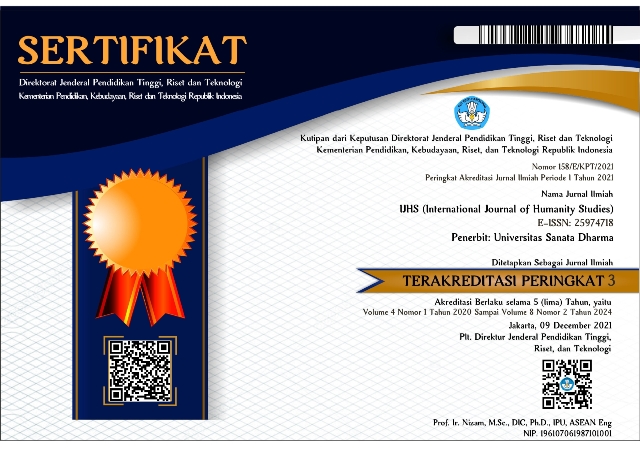IDEAS OF SCIENCE AND NATURE IN BIOGRAPHIES FOR FILIPINO CHILD READERS
(1) University of the Philippines Diliman
(*) Corresponding Author
Abstract
Many biographies for children are written to teach their readers social values and acceptable patterns of behavior. But even when no such pedagogical aims are stated, biographies for children perform an ideological function. Since they narrate a “true story,” they direct young readers to think of the world and its people in the way these are presented in the text.
The Bookmark Inc.’s Woman of Science Series comprises ten books, each narrating an episode in the life of a living Filipino woman scientist. The Series’ aim is to encourage more Filipino girls to consider careers in science. Its author, Didith T. Rodrigo, herself a scientist, completed writing the series through a grant from the Philippine government.
Using an ecofeminist lens, I analyze the Series to answer the following questions: What political view point or interests do these biographies serve? What patterns of behavior do they motivate children to emulate? What social relationships , and relationships between the human and non-human, do they tend to reify? I argue that the Series generally promotes anthropocentric views of science, consistent with Philippine policy pronouncements on science. However, tension points between this ideological frame and the words and practices of scientists featured in the series can be gleaned from the Series itself. I demonstrate how these tension points can lead to fruitful discussions on scientific practice informed by ecological understanding.
Keywords
Full Text:
PDFReferences
——— (n.d. b). Male vs. female enrolment by discipline group 2016-2017. Statistics. https://ched.gov.ph/statistics/.
Ang, F. E. (2016). An analysis of the biography for young readers as literary history through the great lives series by Tahanan
Asian Development Bank. (2018, December 5). Closing the gender gap. Asian Development Bank. https://www.adb.org/themes/gender/overview.
Books . PROCEEDINGS The 4th Literary Studies Conference “Children’s Literature in Southeast Asia” (pp. 95–107). Universitas Sanata Dharma.
Bell, D. (1960). The end of ideology: On the exhaustion of political ideas in the fifties. The free Press of Glencoe.
Commission on Higher Education (n.d. a). Higher education sex-disaggregated data. Statistics. https://ched.gov.ph/statistics/.
Curry, A. (2013). Environmental crisis in young adult fiction: A poetics of earth. Palgrave Macmillan.
Government of the Philippines (2017). Philippine development plan 2017-2022 abridged version, national economic development authority. http://www.neda.gov.ph/wp-content/uploads/2018/01/Abridged-PDP-2017-2022_Updated-as-of-01052018.pdf.
Heise, U. Science and ecocriticism. ASLE. https://www.asle.org/wp-content/uploads/ASLE_Primer_Heise.pdf.
Heriot, G. (1948). Children and biography. Elementary English, 25(2), 98-102. https://www.jstor.org/stable/i40067213
Leitch, V. (2001). Louis Althusser. In The Norton anthology of theory and criticism (pp. 1476–1508). Norton.
Plumwood, V. (2001). Nature as agency and the prospects for a progressive naturalism. Capitalism Nature Socialism, 12(4), 3–32. https://doi.org/10.1080/104557501101245225
Rodrigo, D. (2017 a). Beyond the storm: A story about Gemma Narisma. The Bookmark, Inc.
Rodrigo, D. (2017 b). Capturing flight: A story about Nina Ingle. The Bookmark, Inc.
Rodrigo, D. (2017 c). Cave Dweller: A story about Ging Nuneza. The Bookmark, Inc.
Rodrigo, D. (2017 d). Chemical romance: A story about Connie Ragasa. The Bookmark, Inc.
Rodrigo, D. (2017 e). Gardener of the sea: A story about Nida Calumpong. The Bookmark, Inc.
Rodrigo, D. (2017 f). Mangrove warrior: A story about Jurgenne Primavera. The Bookmark, Inc.
Rodrigo, D. (2017 g). Random walks: A story about Jinky Bornales. The Bookmark, Inc.
Rodrigo, D. (2017 h). Rigid motion: A story about Ninette de las Penas. The Bookmark, Inc.
Rodrigo, D. (2017 i). Treasure from trash: A story about Evelyn Taboada. The Bookmark, Inc.
Rodrigo, D. (2017 j). The stuff of life: A story about Giselle Concepcion. The Bookmark, Inc.
UNESCO (n.d.). UNESCO science, technology, and innovation policy development. Science, Technology, and Innovation Policy. http://www.unesco.org/new/en/natural-sciences/science-technology/sti-systems-and-governance/sti-policy-development/.
Ortiz-Ospina, E., & Roser, M. (2016, February 9). Child labor. Our World in Data. https://ourworldindata.org/child-labor.
UNICEF. (2020 b, January 19). Girls' education. UNICEF. https://www.unicef.org/education/girls-education.
UNICEF. (2020 a, March 4). Gender and education. UNICEF DATA. https://data.unicef.org/topic/gender/gender-disparities-in-education/.
DOI: https://doi.org/10.24071/ijhs.v4i2.3152
Refbacks
- There are currently no refbacks.
Copyright (c) 2021 Christine Veloso Lao

This work is licensed under a Creative Commons Attribution-ShareAlike 4.0 International License.
Indexed and abstracted in:
IJHS Sinta 3 Certificate (S3 = Level 3)
International Journal of Humanity Studies (IJHS) has been nationally accredited Sinta 3 by the Ministry of Education, Culture, Research and Technology of the Republic of Indonesia based on the decree No. Surat Keputusan 158/E/KPT/2021. Validity for 5 years: Vol 4 No 1, 2020 till Vol 8 No 2, 2024

This work is licensed under CC BY-SA.
Creative Commons Attribution-ShareAlike 4.0 International License.
p-ISSN: 2597-470X (since 31 August 2017); e-ISSN: 2597-4718 (since 31 August 2017)
Notice: The opinions expressed in this publication are those of the authors. They do not purport to reflect the opinions or views of the editorial team or publishers.
International Journal of Humanity Studies (IJHS) is a scientific journal in English published twice a year, namely in September and March, by Sanata Dharma University, Yogyakarta, Indonesia.

















